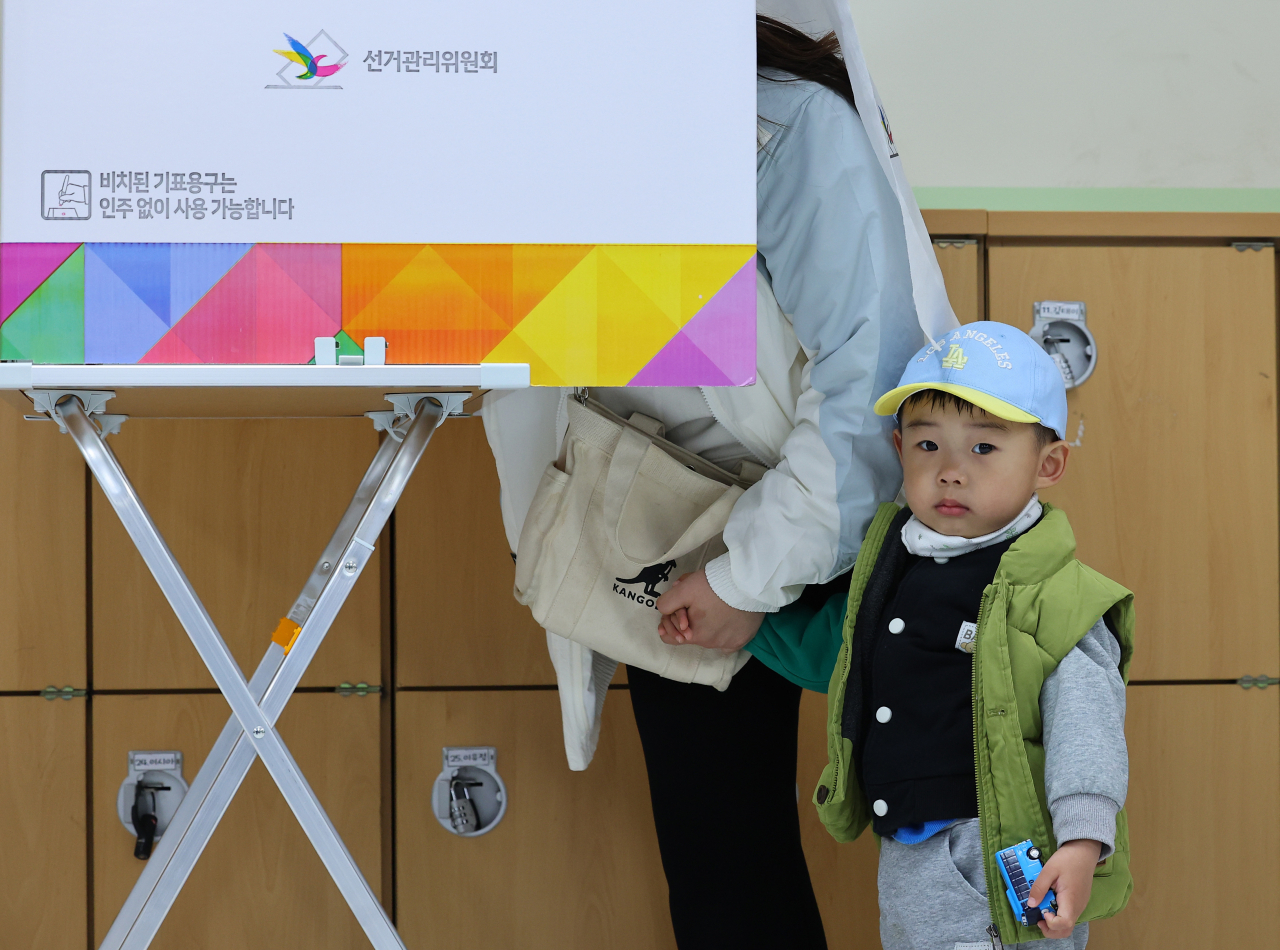 |
A child is seen accompanying his mother casting a ballot at a polling station on Wednesday. (Yonhap) |
South Korean voters headed to the polls Wednesday for the country's 22nd parliamentary elections, as the country's political landscape continues to experience a deepening divide and increasing tensions.
The outcome of the latest elections was expected to shape the policy road President Yoon Suk Yeol will walk for his remaining three years in office. The possible scenario of the liberal main opposition party maintaining a majority in the single-chamber, 300-member National Assembly was projected to make Yoon a lame-duck president.
Around 59.3 percent of the total 44.28 million eligible voters across the country had cast their ballots as of 3 p.m. on Wednesday, according to the National Election Commission. The figure includes the turnout for two days of early voting held last week.
Polls opened for 12 hours from 6 a.m. at 14,259 polling stations across the country.
Wednesday’s election followed months of mudslinging and hostile discourse between the rival parties, which observers say has resulted in a deeply polarized political landscape.
“The toxic rhetoric and mudslinging has been prominent in the weeks leading up to the election, (which) has been one of the harshest in (the country's) political history,” said Lee Nae-young, a political science professor at Korea University.
“It seems we were never really able to compare and assess the policy pledges tied to key issues such as national security and the low birth rate that the rival parties rolled out for the election,” he added.
With the election set to work as a referendum for Yoon, the president's fate appeared to be hanging in the balance, as he could either spend the rest of his years in office in a state of stagnation, or he could make significant progress in his administration’s policy goals, depending on the result.
Under the scenario of the main opposition Democratic Party of Korea alone securing 151 seats or more, as forecasted on the eve of the election, it was believed that the Yoon administration and the conservative bloc would be unable to freely pursue their agenda over the next three years. This scenario would see a repeat of what has happened over the past two years, with the opposition-controlled Assembly passing multiple contentious bills and Yoon vetoing them, according to political commentators.
The DP and its satellite party had won a total of 180 seats in the previous general elections.
The worst-case scenario for Yoon was the main opposition, along with fellow opposition forces including the Rebuilding Korea Party launched by disgraced ex-Minister Cho Kuk, securing 200 seats or more. Securing two-thirds of the parliament, a coalition liberal bloc could launch an impeachment inquiry into the incumbent president.
The ruling People Power Party was projected to secure some 120 to 140 seats in the Assembly, according to a similar forecast. This outcome could help several of Yoon’s key initiatives gain momentum, including the administration's policies on boosting the birth rate and pursuing trilateral security cooperation with the US and Japan.
In the recent months leading up to the election, Yoon and the ruling party have been weighed down by multiple risks stemming from growing public displeasure over soaring food prices, as well as over scandals tied to first lady Kim Keon Hee and former Ambassador to Australia Lee Jong-sup.
Meanwhile, leaders of the main parties urged voters to head to the polls on the day of the elections.
“I ask (our candidates) as the party chairman to give everything you've got to urge voters to vote,” said ruling party interim leader Han Dong-hoon in a message sent out to the party's candidates.
Democratic Party of Korea Chair Lee Jae-myung uploaded a video on his Facebook page asking voters to “wake up and vote," highlighting the importance of a single vote in swing districts and key political battlegrounds. Neck-and-neck races were expected in some 50 districts across the nation.
Of the total 300 seats in the Assembly, 254 are to be elected through direct votes in local districts while the remaining 46 are allotted through proportional voting.







![[Today’s K-pop] Blackpink’s Jennie, Lisa invited to Coachella as solo acts](http://res.heraldm.com/phpwas/restmb_idxmake.php?idx=644&simg=/content/image/2024/11/21/20241121050099_0.jpg)